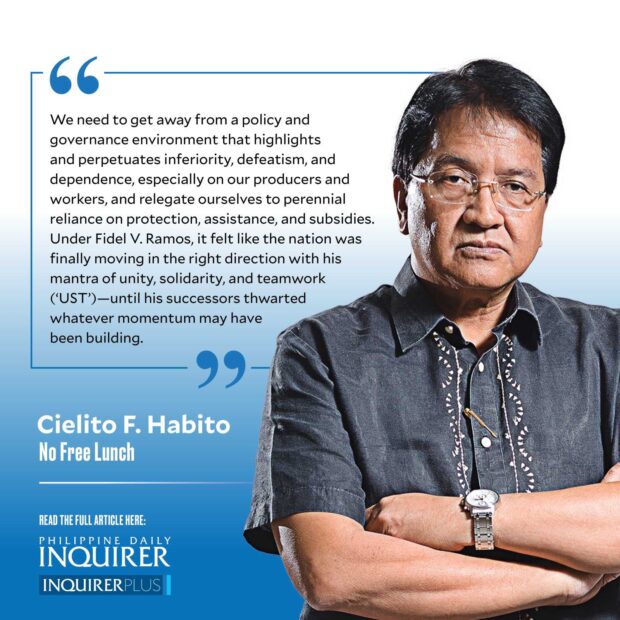Bringing out our best
In the early part of his 1992 to 1998 term, provincial visits of President Fidel V. Ramos (FVR) would usually have local executives publicly presenting him with a litany of local problems and requests for various things they needed from the national government. But Ramos was no Santa Claus. Instead of promises of largesse dispensed from national funds, he would often respond with lectures on his trademark “bibingka” governance, that is, combining fire from the bottom with fire from the top to achieve a perfectly cooked rice cake. His metaphor included how various ingredients brought by different cooks enrich the cake and make it wholesome for all. It was FVR’s way of challenging his audiences to work in active partnerships across different sectors and stakeholders to get things done. And his bibingka challenge gained headway. Later in his presidency, I noticed a distinct difference in public forums during his provincial visits. No longer were governors and mayors presenting him with Santa Claus wish lists. Instead, they proudly reported to him various things they had done to help themselves and improve the lives of their constituents—with little or no help from Malacañang.
Another story I’ve told many times is about the industrialist who barged into my office early in my tenure as the country’s chief socioeconomic planner, pointing his finger at my nose and accusing me of killing his company and the manufacturing industry as a whole. He was alluding to our liberalized trade and investment policies in our pursuit of international competitiveness, one of FVR’s twin development thrusts (the other being people empowerment). Toward the end of FVR’s term, I watched this same industrialist publicly praise President Ramos for his liberalization strategy, proudly announcing that he was already exporting his products to as far as South America. While previously content with selling domestically in a protected market, he was led to invest to shape up to the competition and discovered the great potential for growth in the international export markets.
Article continues after this advertisementHaving been privileged to work in the Cabinet of President Ramos all throughout his six-year term, I directly witnessed such striking positive transformations in people, which resulted from the policies and leadership style that defined his presidency. It was only under him that I saw us getting closest to the kind of governance our country has always needed, with leaders and policies that would bring out the best (rather than the worst) in all of us. We need to get away from a policy and governance environment that highlights and perpetuates inferiority, defeatism, and dependence, especially on our producers and workers, and relegate ourselves to perennial reliance on protection, assistance, and subsidies. Under Ramos, it felt like the nation was finally moving in the right direction with his mantra of unity, solidarity, and teamwork (“UST”)—until his successors thwarted whatever momentum may have been building.
Not a few believe, for good reason, that certain segments of our society actually see it in their favor, and prefer to perpetuate such a mindset of inferiority, defeatism, and dependence. We’ve heard it said that not a few in the economic and political elite actually welcome how it reinforces and preserves their power and superiority over the many. On the other hand, for leftists whose underlying aim is to sow and grow class conflict to foment revolution, it serves their ultimate goal of a revolutionary power grab. They would like to widen the rift, heighten the conflict, and fuel the simmering social volcano to the point of eruption. Either way, it would seem that bringing out our worst is all about power, whether to preserve it or grab it.
But I am certain that the vast majority of us Filipinos would like to see us finally succeed in achieving a strong nation marked by an inclusive society and economy, built on our inherent strengths. Filipinos rightly take pride in possessing so many positive values and traits; we just need leaders and policymakers who would strive to bring these out through their policies, decisions, and actions. They are, I believe, still the majority.
Article continues after this advertisement——————
cielito.habito@gmail.com

















